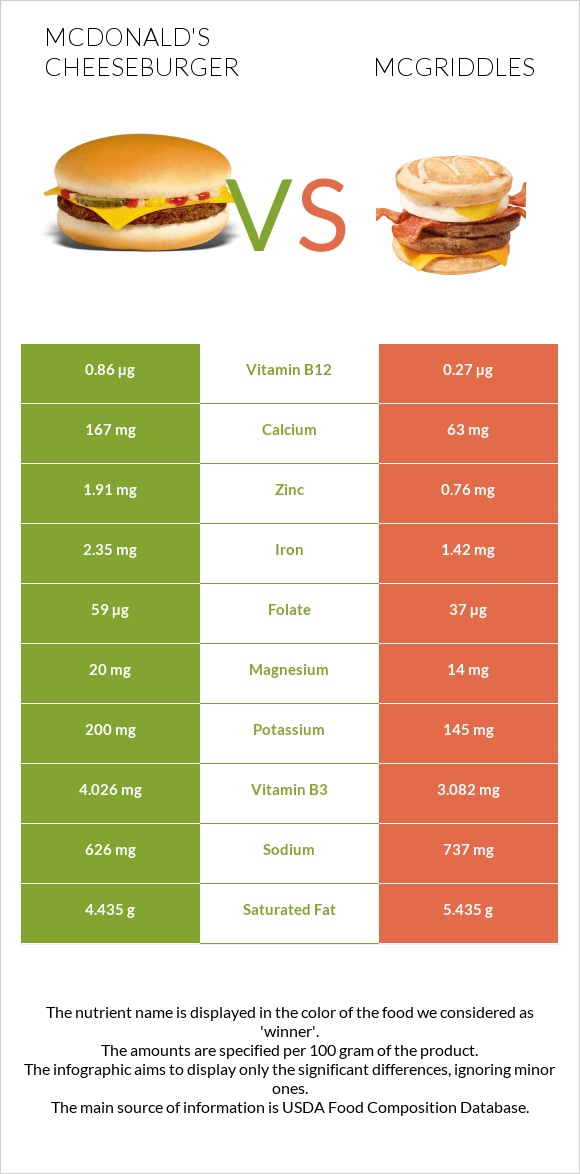McDonald's cheeseburger vs. McGriddles — In-Depth Nutrition Comparison
Compare
Differences between mcDonald's cheeseburgers and mcGriddles
- McDonald's cheeseburgers have more vitamin B12, iron, zinc, calcium, vitamin B2, vitamin B3, and folate, while mcGriddles have more phosphorus.
- McGriddles' daily need coverage for phosphorus is 25% higher.
- McGriddles contain 3 times less vitamin B12 than mcDonald's cheeseburgers. McDonald's cheeseburgers contain 0.86µg of vitamin B12, while mcGriddles contain 0.27µg.
- The amount of sodium in mcDonald's cheeseburgers is lower.
The food types used in this comparison are McDONALD'S, Cheeseburger and McDONALD'S, Sausage McGRIDDLES.
Infographic

Infographic link
Mineral Comparison
Mineral comparison score is based on the number of minerals by which one or the other food is richer. The "coverage" charts below show how much of the daily needs can be covered by 300 grams of the food.
| Contains more MagnesiumMagnesium | +42.9% |
| Contains more CalciumCalcium | +165.1% |
| Contains more PotassiumPotassium | +37.9% |
| Contains more IronIron | +65.5% |
| Contains more CopperCopper | +22.8% |
| Contains more ZincZinc | +151.3% |
| Contains less SodiumSodium | -15.1% |
| Contains more ManganeseManganese | +16.2% |
| Contains more PhosphorusPhosphorus | +125.7% |
Vitamin Comparison
Vitamin comparison score is based on the number of vitamins by which one or the other food is richer. The "coverage" charts below show how much of the daily needs can be covered by 300 grams of the food.
| Contains more Vitamin CVitamin C | +∞% |
| Contains more Vitamin B2Vitamin B2 | +66.7% |
| Contains more Vitamin B3Vitamin B3 | +30.6% |
| Contains more Vitamin B12Vitamin B12 | +218.5% |
| Contains more FolateFolate | +59.5% |
All nutrients comparison - raw data values
| Nutrient |  |
 |
DV% diff. |
| Phosphorus | 140mg | 316mg | 25% |
| Vitamin B12 | 0.86µg | 0.27µg | 25% |
| Polyunsaturated fat | 0.355g | 2.591g | 15% |
| Iron | 2.35mg | 1.42mg | 12% |
| Calcium | 167mg | 63mg | 10% |
| Zinc | 1.91mg | 0.76mg | 10% |
| Monounsaturated fat | 3.631g | 7.532g | 10% |
| Protein | 12.97g | 8.41g | 9% |
| Fats | 11.79g | 17.76g | 9% |
| Vitamin B2 | 0.26mg | 0.156mg | 8% |
| Vitamin B5 | 0.384mg | 8% | |
| Vitamin B6 | 0.108mg | 8% | |
| Vitamin B3 | 4.026mg | 3.082mg | 6% |
| Folate | 59µg | 37µg | 6% |
| Sodium | 626mg | 737mg | 5% |
| Saturated fat | 4.435g | 5.435g | 5% |
| Cholesterol | 35mg | 24mg | 4% |
| Fructose | 2.59g | 0.14g | 3% |
| Calories | 263kcal | 312kcal | 2% |
| Potassium | 200mg | 145mg | 2% |
| Copper | 0.097mg | 0.079mg | 2% |
| Vitamin C | 0.6mg | 0mg | 1% |
| Carbs | 27.81g | 31.25g | 1% |
| Magnesium | 20mg | 14mg | 1% |
| Manganese | 0.23mg | 0.198mg | 1% |
| Vitamin B1 | 0.223mg | 0.209mg | 1% |
| Net carbs | 26.71g | 30.25g | N/A |
| Sugar | 6.22g | 11.23g | N/A |
| Fiber | 1.1g | 1g | 0% |
| Trans fat | 0.647g | 0.956g | N/A |
Macronutrient Comparison
Macronutrient breakdown side-by-side comparison
Protein:
12.97 g
Fats:
11.79 g
Carbs:
27.81 g
Water:
45 g
Other:
2.43 g
Protein:
8.41 g
Fats:
17.76 g
Carbs:
31.25 g
Water:
40.11 g
Other:
2.47 g
| Contains more ProteinProtein | +54.2% |
| Contains more WaterWater | +12.2% |
| Contains more FatsFats | +50.6% |
| Contains more CarbsCarbs | +12.4% |
~equal in
Other
~2.47g
Fat Type Comparison
Fat type breakdown side-by-side comparison
Saturated fat:
Sat. Fat
4.435 g
Monounsaturated fat:
Mono. Fat
3.631 g
Polyunsaturated fat:
Poly. Fat
0.355 g
Saturated fat:
Sat. Fat
5.435 g
Monounsaturated fat:
Mono. Fat
7.532 g
Polyunsaturated fat:
Poly. Fat
2.591 g
| Contains less Sat. FatSaturated fat | -18.4% |
| Contains more Mono. FatMonounsaturated fat | +107.4% |
| Contains more Poly. FatPolyunsaturated fat | +629.9% |
Carbohydrate type comparison
Carbohydrate type breakdown side-by-side comparison
Starch:
0 g
Sucrose:
0.24 g
Glucose:
2.01 g
Fructose:
2.59 g
Lactose:
0.54 g
Maltose:
0.84 g
Galactose:
0 g
Starch:
0 g
Sucrose:
6.16 g
Glucose:
3.91 g
Fructose:
0.14 g
Lactose:
0.54 g
Maltose:
0.48 g
Galactose:
0 g
| Contains more FructoseFructose | +1750% |
| Contains more MaltoseMaltose | +75% |
| Contains more SucroseSucrose | +2466.7% |
| Contains more GlucoseGlucose | +94.5% |
~equal in
Starch
~0g
~equal in
Lactose
~0.54g
~equal in
Galactose
~0g




